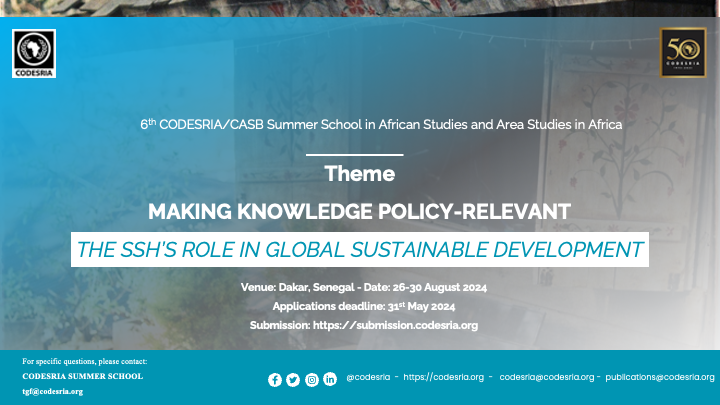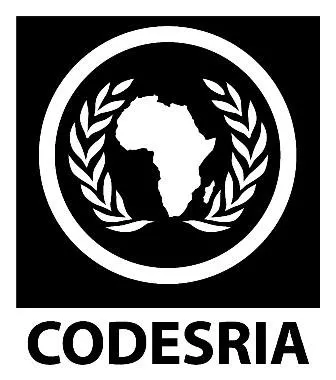
6th CODESRIA/CASB Summer School in African Studies and Area Studies in Africa
Theme: Making knowledge policy-relevant: The SSH’s role in global sustainable development
Venue: Dakar, Senegal
Date: 26-30 August 2024
Applications deadline: 31st May 2024
The Council for the Development of Social Science Research in Africa (CODESRIA) and The Centre for African Studies in Basel (CASB) call for applications for their 6th Summer School in African Studies and Area Studies in Africa. The Summer School is offered with the generous support of the Oumou Dilly Foundation (Switzerland) in cooperation with CODESRIA and aims at strengthening the links between the CODESRIA community of scholars and scholars from the African Studies community in Switzerland.
The overall objective of the Summer School is to stimulate and consolidate interdisciplinary approaches to research on Africa, but also on other regions of the world undertaken from within the African continent. It focuses on African Studies as an instance of area studies and seeks to identify themes that are theoretically, conceptually, and methodologically relevant to the reflection on the intellectual challenge of Africa as an ‘object’ of knowledge and its contribution to general scholarship while inquiring into the relevance of the findings to African approaches to other regions.
The goals of the Summer School are the following:
- Give current PhD students and early career scholars the opportunity to engage critically with new theoretical, conceptual, and methodological issues relating to African Studies relevant to their work.
- Encourage participants to reflect on the potential relevance of African epistemology and ontology in enhancing theoretical, conceptual, and methodological tools both in their disciplines as well as in interdisciplinary work.
- Foster among summer school beneficiaries a sense of belonging to a community of scholars in pursuit of African-informed scholarship.
- Stimulate emerging scholars to work towards carving a space for African Studies in the broader field of scholarship and, in this way, helping African Studies to claim a place right at the center of knowledge production in Africa and globally.
The Summer School offers young SSH scholars a platform to examine the challenges of the tension and the potential for mutual fertilization between the requirements of scholarly standards and social impact in Africa. Participants will reflect on their research’s potential for societal transformation, develop theoretical and methodological skills in interdisciplinary and transdisciplinary collaboration, and learn to locate themselves in various academic and policy fields from an African lens.
Concept Note.
Graduate students are typically highly motivated to carry out research relevant to current policy issues and benefits society. However, standard practices and traditions of scientific knowledge production do not guarantee that these objectives can be achieved in the context of graduate research projects. There is a need for training courses that address theoretical and conceptual issues and practical challenges. The CODESRIA/CASB Summer School 2024 seeks to addresses the policy relevance gap in most social sciences and humanities (SSH) studies in general and area studies in particular. This is done by mapping out the differences between basic and applied research. The crucial distinction is between knowledge production geared towards understanding problems and knowledge production aiming at identifying solutions. The Summer School aims to harness the strengths of basic research in fields bearing directly on development in Africa to emphasize the need for an actual understanding of the problems to be addressed. Policy relevance should bear on working out the terms under which good problem definitions can yield policy options. The ultimate goal of the Summer School is to help participants develop critical skills enabling them to become researchers who live up to the highest scientific standards and are equipped with the transformative skills to make an impact.
Faced with global sustainability challenges calling for transnational, interdisciplinary and inter-sectoral approaches, evidence-based policy has emerged as a critical notion for designing and implementing policies by governments, international organizations and NGOs. This entails a growing demand for policy-relevant knowledge posing questions about the relationship between basic and applied research and the standards to which research should adhere, i.e. scientific rigor and societal transformation. This is especially true in the social sciences and humanities, which often appear to resist this growing demand. This impression bears, in part, on the SSH’s emphasis on conceptual issues, which in turn, put the SSH in a position to engage with issues of critical importance to the development of sustainable, practical approaches and their implementation on an international and global level.
One critical area in the distinction between basic and applied research concerns how the emphasis on solutions (applied research) may reflect the power of international institutions, development actors or funding organizations in the ‘North’ to define the problems of Africa (and other ‘Southern’ corners of the world). This issue plays a central role in debates over coloniality, positionality or diversity and provides a framework within which engaging with conceptual issues (those that help us define and understand problems) may contribute towards making better policy choices in the interest of the societies concerned. In contrast to SSH in general, area studies have an interdisciplinary tradition and, historically, an applied orientation. This orientation continues in the specific expectations towards the SSH in the context of the so-called Global South regarding policy relevance, going as far as to make solution orientation justifying their continuation.
In focused training sessions, the Summer School will address theoretical and conceptual issues bearing on the difference between understanding and defining a problem (basic research) and identifying solutions and their scope (applied research), as well as policy issues on the conditions, which must be created for solutions to work (implementation). This will be done with attention to issues of transdisciplinarity and the co-production of knowledge. Given the importance of coming to terms with calls for the decolonization of development cooperation, there will be a focus on the role of values and norms in transferring knowledge between academic actors, policy-makers and society more generally and on their implications for developing and implementing policies in particular.
Application procedures
The 6th CODESRIA/ZASB Summer School invites applications from doctoral students interested in exploring these issues as part of a larger framework of engaging with methodological challenges in African Studies.
The Summer School is open for PhD students and early career scholars at Higher Education institutions on the African continent. Preference will be given to those in their first or second year of PhD enrollment). Applications will be considered from students working in the following disciplines: Social Anthropology, Sociology, History, Religion, Philosophy, Gender studies and Political science. Applications from PhD students registered in Swiss universities are also encouraged.
Travel, accommodation and meals during the Summer School will be provided for participants from African Institutions. The Convenors of the Summer School will also be open to receiving a limited number of applicants able and willing to pay the cost of participation in the School.
Applications should include the following:
- Motivation or Application letter with a clear statement on how you approach the challenge of “objectivity” in the social sciences and humanities bearing as practiced in Africa and elsewhere.
- Concept paper (5-pages) highlighting: (a) what you are working on (b) how your work relates to the theme of the Summer School; and (c) your expectations from the Summer School.
- A detailed Curriculum vitae
- One letter of recommendation from the candidate’s institution of affiliation or PhD supervisor for early career scholars.
- Passport copy
- Copy or proof of PhD registration at an African or Swiss University (for PhD students). Copy of doctoral certificate for early career scholars.
Incomplete applications may not be considered.
Applicants are requested to use the following link https://submission.codesria.org to submit their proposals.
For specific questions, please contact:
CODESRIA SUMMER SCHOOL






